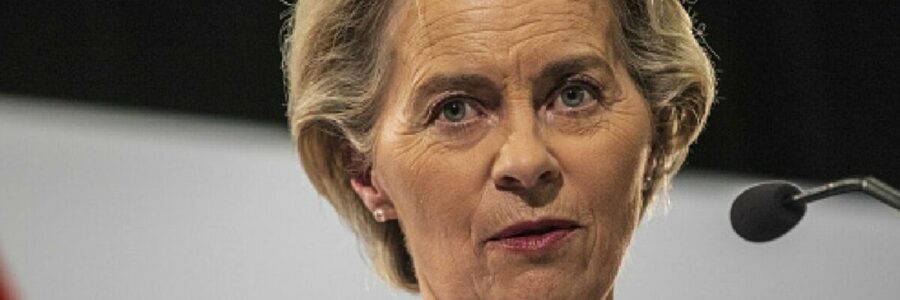
VDL tells EU leaders to avoid ‘cheaper gas’ reaching UK
Energy bills: Expert advises to 'close curtains' when heating is on
We use your sign-up to provide content in ways you’ve consented to and to improve our understanding of you. This may include adverts from us and 3rd parties based on our understanding. You can unsubscribe at any time. More info
Ursula von der Leyen has told EU leaders to ensure that any cheaper gas the bloc secures does not reach the UK. With no legal proposal for a price cap on the table yet, ministers meeting in Luxembourg are expected to debate the principles of how an EU gas price limit could work, as well as possible drawbacks. Europe has been scrambling to tame high energy prices after Russia slashed gas supplies following its invasion of Ukraine – sending gas prices skywards and pushing European power prices to record levels in August.
But gas costs have tumbled far below that level in recent days, amid mild weather and as countries have filled storage tanks. Some EU diplomats suggested this could dampen momentum to cap energy costs.
The European Commission last week asked for countries’ approval to draft a proposal for a price limit on trades at the Title Transfer Facility (TTF) Dutch gas hub, which could be triggered if prices spiked. A few days later, EU country leaders requested “concrete decisions” from their ministers and Brussels on this idea.
EU diplomats said today’s talks could give the Commission the green light on that proposal, but some said countries were seeking more details on how the potential price cap would work.
“It will not be a couple of days,” one senior EU official said, adding it what not yet clear when Brussels would make a firm proposal.


Any proposal would need to be negotiated by EU countries, possibly with the aim of approving it at an emergency meeting of energy ministers in November.
Ahead of the talks, the Ursula von der Leyen’s team shared a document with countries that cautioned against another type of price cap, for gas used to generate power, which it said could cause an increase in gas use.
The document says that EU member states would be in charge of tackling redistribution of energy within the bloc.
The move, championed by France, would also require measures to prevent the resulting cheaper electricity from flowing to non-EU countries like Britain and Switzerland that do not have the price cap, the document said.
The proposal would come as a blow not only to Britain but also to Germany as Berlin would have to provide a big chunk of its electricity to its struggling neighbour France.
And it is Paris that would be “the biggest net beneficiary” of the plans, as the Commission admitted itself in the paper.
Germany and the Netherlands have warned that price caps to make gas cheaper could cause a spike in consumption at a time when countries are racing to save fuel and replace Russian deliveries. Russia supplied 155 billion cubic metres of gas to the EU before the invasion.
The Commission said if market gas prices were €180 per megawatt hour for a year, the scheme could yield a net benefit of €13 billion and help to tame inflation – but that the benefits would not be evenly spread. Gas prices have tumbled far below that level in recent days, amid mild weather and brimming storage tanks.
Germany, the Netherlands and Italy, who produce significant volumes of gas-fuelled power, would face the highest costs to fund the scheme, said the document, which did not specify how the EU-wide mechanism would be financed.
DON’T MISS:
Putin ‘preparing for conflict with West’ – and may target dam [INSIGHT]
Wagner boss pulls rug from under Putin by ignoring Kremlin’s narrative [ANALYSIS]
Sunak could be first PM to shun Downing Street for £6.6m townhouse [DATA]
Britain has been riding to the rescue of mainland Europe this year, becoming a net exporter of electricity for the first time since 2017.
The switch was caused by the record shutdowns of French nuclear reactors.
France’s difficulties pushed power prices in the country to record highs, leading to the regular occurrence of exports from London to Paris.
They have also exacerbated the energy crisis in the EU as the bloc tackles cuts in energy imports from Russia.
Source: Read Full Article